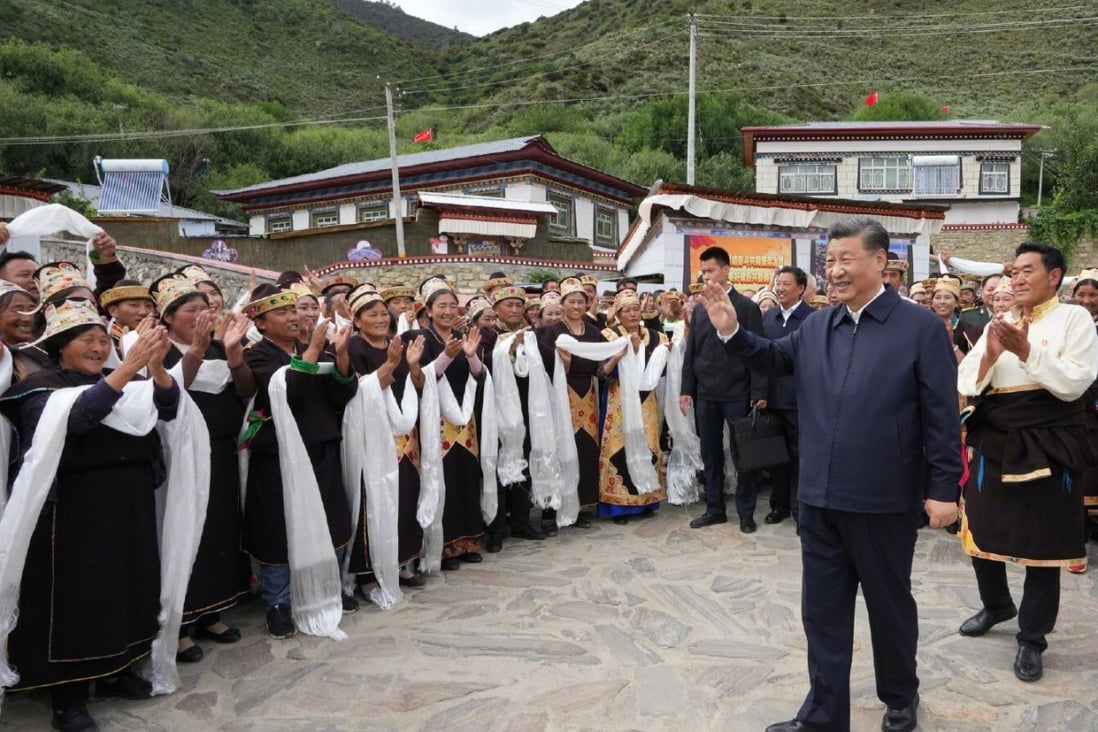Xi Jinping has made his first visit to Tibet as Chinese president, affirming Beijing’s control over a region where its military buildup and policies on ethnic assimilation have drawn international criticism.
Xi arrived in the regional capital of Lhasa on Thursday, the official Xinhua News Agency wrote on social media. He inspected the operations of the Sichuan-Tibet railway during his visit, China Central Television said.
State media showed Xi being greeted by enthusiastic Tibetans and riding a train with Liu He, China’s economic czar, and Zhang Youxia, vice chairman of the Central Military Commission.
Robert Barnett, a British academic who has written about Tibet, posted videos showing the Chinese leader speaking to locals.
“All regions and people of all ethnicities in Tibet will march toward a happy life in future,†Xi says in one video. “I am full of confidence as you all are. Lastly, I will not delay your dancing. Let me say this: I wish everyone a happy life and good health.â€
“Tashi Delek,†he adds, using a phrase wishing good fortune.
Earlier this year, the People’s Republic of China marked the 70th anniversary of its assertion of sovereignty over Tibet. That was part of a broader effort by Mao Zedong’s communists to consolidate control over territory historically claimed by China before decades of colonialism, war and internal strife.
The region is at the center of border tensions with India. Both sides have reorganized forces to the area after the deadliest fighting in decades last year.
Earlier this month, Indian Foreign Minister Subrahmanyam Jaishankar and Chinese counterpart Wang Yi agreed to continue discussions over the border standoff. Those talks came after India redirected at least 50,000 extra troops to the border in a historic shift toward an offensive military posture against the world’s second-biggest economy. India had roughly 200,000 troops focused on the border at the time, according to two people familiar with the matter.
China has faced criticism for its policies in Tibet, which has been subject to intense social, security and religious controls, much like its northern neighbor Xinjiang. In May, Wu Yingjie, the Communist Party chief of mostly Buddhist Tibet, lauded the progress Beijing has made developing the region, saying that “religion has been increasingly compatible with a socialist society.â€
Xi told officials at a meeting on Tibet issues in August last year to “actively guide Tibetan Buddhism to adapt to socialist society, and promote the Sinofication of Tibetan Buddhism.â€
“To govern a country, it’s necessary to govern the border,†Xi said at the symposium, where the party discussed policies for developing the region. “To govern the border, it’s required to stabilize Tibet first.â€
Xi’s visit comes about two weeks after Tenzin Gyatso, the 14th Dalai Lama, turned 86. The choice of successor to the spiritual leader of Tibetans, who now lives in exile in India, is shaping up to be a struggle between India and the U.S. on one hand and China on the other.
Senior security officials in India, including in the prime minister’s office, have been involved in discussions about how New Delhi can influence the choice of the next Dalai Lama, Bloomberg News reported in April. China’s Foreign Ministry has said the reincarnation of the Dalai Lama is an internal affair that “allows no interference.â€
In September last year, prominent Xinjiang researcher Adrian Zenz released a report alleging that Beijing was instituting a mass labor system in Tibet similar to the one it has rolled out in Xinjiang. Tibet Governor Qi Zhala said at the time that forced labor transfer “does not exist,†maintaining that the local government was focused on providing job training.
Radio Free Asia reported Thursday that security measures limiting people’s movements in public were in place in Lhasa, and that work at factories and construction sites has been halted. A ban on flying drones and kites was also in place, it said.
Tenzin Lekshay, a spokesman for the Tibet government in exile in northern India, wrote in a tweet that Xi should “understand the true aspiration of Tibetan people and resume the dialogue to resolve the Sino-Tibetan conflict.â€
In a time of both misinformation and too much information, quality journalism is more crucial than ever.
By subscribing, you can help us get the story right.






